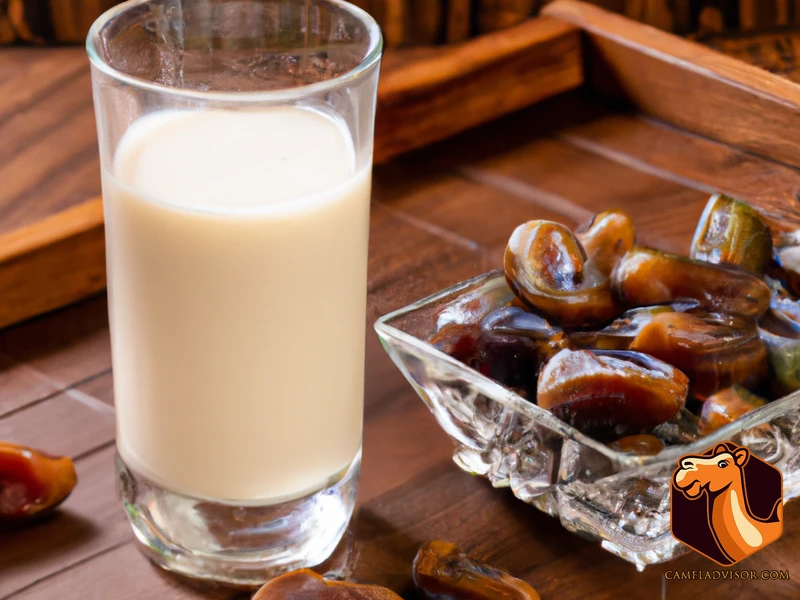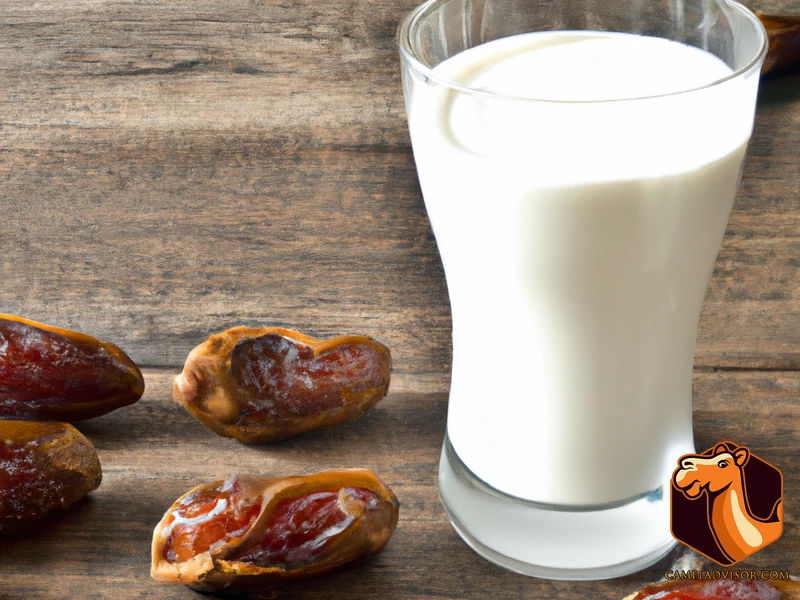Camel milk has been consumed for centuries in various parts of the world, yet many people are still unaware of its nutritional value and health benefits. This wonder beverage is packed with essential nutrients that are vital for maintaining a balanced diet. From proteins and amino acids to vitamins and minerals, camel milk is a rich source of nutrients that promote good health. In this article, we will explore the role of camel milk in a balanced diet by highlighting its nutritional value, health benefits, and ways to incorporate it into your daily routine. So, if you’re looking to add a unique and healthy twist to your diet, read on to discover the wonders of camel milk!
Contents
- Nutritional Value of Camel Milk
- Health Benefits of Camel Milk
- Incorporating Camel Milk into Your Diet
- Final Thoughts
-
Frequently Asked Questions
- What is camel milk?
- How is camel milk different from cow’s milk?
- Is camel milk safe to drink?
- Can people with lactose intolerance drink camel milk?
- What are the health benefits of camel milk?
- Can camel milk be used in cooking and baking?
- Is camel milk more expensive than cow’s milk?
- What does camel milk taste like?
- Is camel milk popular around the world?
- Can I find camel milk in my local grocery store?
- References
Nutritional Value of Camel Milk

Camel milk is known to be a rich source of nutrition, providing a wide array of benefits to the body. Its nutritional value may be attributed to its unique composition, as well as the way it is processed. In fact, studies have shown that camel milk is nutritionally superior to cow’s milk in various aspects. For instance, it contains valuable nutrients such as proteins, vitamins, and minerals that are essential in promoting overall health and well-being. To learn more about the nutritional value of camel milk, read on. You can also check out this article for a detailed comparison of the nutritional value of camel milk and cow milk.
Protein and Amino Acids
Camel milk is an excellent source of protein and amino acids, which are essential for building and repairing tissues. According to a study conducted by the Emirates Center for Food Safety, camel milk contains approximately 2.5-3.0% protein, which is slightly higher compared to cow milk.
Amino acids are the building blocks of protein, and they are essential for the proper functioning of our bodies. Camel milk contains all the essential amino acids that our bodies cannot produce on their own. It is particularly high in arginine, an amino acid that is beneficial for cardiovascular health, and taurine, an amino acid that is essential for the proper functioning of the immune system and nervous system.
In addition to its high protein content, camel milk is also easily digestible, making it an excellent choice for individuals who have difficulty digesting other dairy products. According to a study published in the Journal of Dairy Science, camel milk has a higher digestibility rate compared to cow milk, which means that it is absorbed more easily by the body.
Here is a table that compares the protein and amino acid content of camel milk with cow milk:
| Nutrient | Camel Milk | Cow Milk |
| :————- | :————— | :———– |
| Protein | 2.5-3.0% | 3.2-3.5% |
| Arginine | 121.9 mg/100 g | 96.4 mg/100 g |
| Taurine | 3.28 mg/100 g | 0.3 mg/100 g |
As you can see, camel milk is a great source of protein and essential amino acids, particularly arginine and taurine, which are important for overall health and well-being. It can be an excellent addition to a balanced diet.
If you want to learn more about the health benefits of camel milk, check out our article on the health benefits of camel milk and its nutrition. For individuals who are lactose intolerant, camel milk can be a great alternative to other dairy products. We have also covered how camel milk can help individuals who are lactose intolerant. Additionally, if you are interested in the impact of processing on the nutrition of camel milk, you can read our article on the impact of camel milk processing on its nutrition.
Rich in Vitamins and Minerals
Camel milk is a nutrient-rich dairy product that offers a wide range of vitamins and minerals, making it a valuable addition to a balanced diet. It is packed with essential nutrients that promote overall health and wellbeing. Here are some of the important vitamins and minerals found in camel milk:
| Vitamins | Minerals |
|---|---|
| Vitamin C – an antioxidant that helps boost the immune system and protects against diseases | Calcium – essential for strong bones and teeth |
| Vitamin A – important for vision, skin, and immune health | Iron – vital for red blood cell production and oxygen transport |
| Vitamin E – a powerful antioxidant that protects cells from damage | Potassium – regulates fluid balance, muscle contractions, and nerve signals |
| Vitamin B2 (Riboflavin) – converts food into energy and maintains healthy skin and eyes | Sodium – important for nerve and muscle function and fluid balance |
| Vitamin B3 (Niacin) – essential for energy metabolism and nervous system function | Zinc – promotes wound healing, immune system function, and protein synthesis |
| Vitamin B6 – necessary for brain development and function, and contributes to the synthesis of neurotransmitters | Copper – essential for the formation of red blood cells and connective tissues |
These vitamins and minerals not only support the normal functions of the human body but also help to keep the body healthy and prevent illnesses. It is important to note that the nutritional value of camel milk may vary slightly depending on the breed, feed, and geographical location of the camels. However, regardless of these factors, camel milk is a great source of essential vitamins and minerals that can be beneficial for human health.
Health Benefits of Camel Milk
If you’re looking for a nutritious and tasty addition to your diet, the answer may lie in an unexpected source- camel milk. This unique milk has been praised for its various health benefits and is especially important for those with certain dietary restrictions. Beyond being a delicious alternative to cow’s milk, camel milk offers a multitude of health benefits that are just starting to be recognized by the scientific community. In this section, we will explore the numerous health benefits that camel milk provides and how it may improve your overall wellness.
Good for Lactose Intolerant Individuals
Camel milk is a great option for individuals who are lactose intolerant. This is because it contains low levels of lactose, making it easier to digest than other types of milk. In fact, some studies have shown that it may even improve digestive symptoms in those with lactose intolerance.
Here is a table comparing the lactose content of different types of milk:
| Milk Type | Lactose Content |
|---|---|
| Cow’s milk | 4.7% |
| Goat’s milk | 4.1% |
| Camel milk | 2-3% |
As you can see, camel milk has a significantly lower lactose content compared to cow and goat milk, making it a better option for those with lactose intolerance. Additionally, camel milk also contains probiotics, which can help improve gut health and promote better digestion.
Incorporating camel milk into a lactose intolerant individual’s diet can provide them with the benefits of milk without the negative side effects that come with lactose intolerance.
Helps with Blood Sugar Control
Camel milk has been shown to help with blood sugar control. It contains insulin-like proteins which can help regulate glucose levels in the body.
Studies have shown that drinking camel milk can lead to a significant decrease in fasting blood sugar levels in individuals with Type 2 diabetes. This is attributed to the presence of bioactive compounds in camel milk which have a hypoglycemic effect.
Comparison of Nutritional Values of Cow’s Milk and Camel Milk in per 100 ml
| Cow’s Milk | Camel Milk | |
|---|---|---|
| Calories | 50 | 35 |
| Protein (grams) | 3.2 | 3.4 |
| Fat (grams) | 1.0 | 1.1 |
| Carbohydrates (grams) | 4.8 | 4.5 |
| Calcium (milligrams) | 120 | 130 |
Camel milk has a lower glycemic index compared to cow’s milk, meaning it causes a slower and more gradual release of glucose into the bloodstream. This is beneficial for individuals with diabetes as it helps prevent spikes and drops in blood sugar levels.
Camel milk contains higher levels of insulin-like growth factor which has been shown to improve insulin sensitivity and glucose uptake in the body.
Conclusion
Incorporating camel milk into one’s diet can be a beneficial way to help regulate blood sugar levels, especially for individuals with Type 2 diabetes. It is important to note that camel milk should not be used as a substitute for medication or medical treatment, but rather as a supplement to a balanced diet and healthy lifestyle.
Reduces Inflammation
Camel milk is known for its anti-inflammatory properties, which have been attributed to the presence of different bioactive substances. These substances help to prevent chronic inflammation, which is linked to various diseases such as cancer, heart disease, and diabetes.
Here are some ways in which camel milk can help to reduce inflammation:
- Rich in antioxidants: Camel milk is a good source of antioxidants, which protect the body against free radical damage that can lead to inflammation. Antioxidants like vitamin C, vitamin E, and beta-carotene have been found in camel milk in high concentrations.
- Anti-cancer properties: Camel milk contains compounds that have been shown to inhibit the growth of cancer cells. Studies have suggested that camel milk can be used as an adjunct therapy for cancer patients by reducing inflammation and improving immune function.
- Reduces oxidative stress: Oxidative stress can lead to inflammation and damage to cells. Camel milk contains substances like lactoferrin and immunoglobulins that can help to reduce oxidative stress and prevent inflammation.
- Anti-allergenic properties: Camel milk has been shown to have anti-allergenic properties that can prevent the development of allergic reactions that can lead to inflammation. These properties are attributed to the presence of immunoglobulins in camel milk, which can help to modulate the immune system response.
The anti-inflammatory properties of camel milk can provide numerous health benefits. By reducing chronic inflammation, camel milk can potentially prevent the development of several diseases. Its rich concentration of antioxidants, anti-cancer properties, ability to reduce oxidative stress, and anti-allergenic properties make it a valuable addition to any balanced diet.
Boosts Immune System
Camel milk has been found to have compounds that can enhance the immune system. Research has shown that consuming camel milk can help fight against diseases and infections due to its immunomodulatory properties.
Immunomodulatory Properties of Camel Milk
Camel milk contains proteins such as lactoferrin and immunoglobulins that can enhance the immune system. Lactoferrin is an iron-binding protein that helps in inhibiting the growth of bacteria and viruses. On the other hand, immunoglobulins are antibodies that can help neutralize toxins and harmful microorganisms in the body. These compounds in camel milk can help strengthen the immune system and provide protection against infections.
Antioxidant Properties of Camel Milk
Camel milk also contains antioxidants that can help prevent cell damage caused by free radicals. Free radicals are unstable molecules that can damage cells, leading to diseases such as cancer, diabetes, and heart disease. Camel milk contains antioxidants such as vitamins C and E, flavonoids, and carotenoids that can help protect against the damaging effects of free radicals.
Other Benefits of Boosting the Immune System
Boosting the immune system can provide numerous health benefits. It can help reduce the risk of infections and diseases, promote faster healing, and improve overall health and wellbeing. A strong immune system is also important for individuals with autoimmune diseases or those undergoing cancer treatment as it can help protect against infections.
| Benefits of Boosting the Immune System |
|---|
| Reduces the risk of infections and diseases |
| Promotes faster healing |
| Improves overall health and wellbeing |
| Protects against infections for individuals with autoimmune diseases or undergoing cancer treatment |
Incorporating camel milk into your diet can provide these immune-boosting benefits and promote a healthy and balanced diet.
Incorporating Camel Milk into Your Diet
If you’re looking to add some variety to your diet and are curious about trying new and unconventional foods, camel milk could be a great option to consider. Rich in nutrients and with a distinct flavor, incorporating camel milk into your diet can be a fun and exciting way to mix things up. In this section, we’ll explore different ways to incorporate camel milk into your daily meals, including smoothies, coffee, cheese, and even ice cream. Read on to discover some delicious and innovative ways to enjoy this nutritious beverage.
Camel Milk Smoothies
Indulge in the richness and creaminess of camel milk with camel milk smoothies. These refreshing drinks not only taste delicious, but also offer a wide range of health benefits. Here are some ideas to get you started:
- Chocolate Banana Camel Milk Smoothie: In a blender, combine frozen banana chunks, cocoa powder, a pinch of cinnamon, and a cup of camel milk. Blend until smooth and enjoy this indulgent yet healthy treat.
- Green Camel Milk Smoothie: For a nutritious and refreshing drink, blend together spinach, fresh ginger, half an avocado, a ripe banana, and a cup of camel milk. This smoothie is rich in fiber, vitamins, minerals, and antioxidants.
- Mixed Berry Camel Milk Smoothie: In a blender, combine mixed berries (strawberries, raspberries, and blueberries), a teaspoon of honey, and a cup of camel milk. Blend until smooth and enjoy a burst of fruity flavors.
- Chai Spiced Camel Milk Smoothie: This deliciously spiced smoothie is perfect for a chilly day. Combine chai spice mix (cinnamon, ginger, nutmeg, and allspice), a ripe banana, a cup of camel milk, and a spoonful of honey. Blend until smooth and pour into a glass.
Camel milk smoothies are perfect for breakfast, post-workout, or any time of the day. They are a great way to incorporate the nutritional benefits of camel milk into your diet in a delicious and refreshing way.
Camel Milk Coffee
If you love coffee, then camel milk coffee is a must-try for you! Combining the rich taste and aroma of coffee with the wholesome goodness of camel milk, this beverage is becoming increasingly popular among coffee aficionados. Here are some ways you can enjoy camel milk coffee:
- Classic Camel Milk Latte: Replace regular milk with camel milk in your favorite latte recipe. Add a shot of espresso and a sprinkle of cinnamon for added flavor.
- Camel Milk Cappuccino: For a frothy and light coffee, whip up some camel milk and pour it over a shot of espresso. Sprinkle some cocoa powder on top to finish it off.
- Camel Milk Mocha: Add some cocoa powder or chocolate syrup to your camel milk latte for a delightful mocha experience.
- Iced Camel Milk Coffee: For a refreshing summer beverage, pour some cold brewed coffee over ice and mix it with camel milk. Add some honey or vanilla syrup to sweeten it up.
What’s great about camel milk coffee is that it provides a healthy alternative to regular coffee. Camel milk is lower in fat than cow’s milk and contains more unsaturated fatty acids. It is also rich in Vitamin C, calcium, and iron. The combination of camel milk and coffee results in a delicious and nourishing beverage that is perfect for any time of day. Give camel milk coffee a try and discover your new favorite drink!
Camel Milk Cheese
Cheese is a versatile ingredient that can add a rich and creamy texture to many dishes. Using camel milk to make cheese is a great alternative to traditional cow’s milk cheese for those who are lactose intolerant or looking for a unique flavor. Camel milk cheese is also packed with nutrients and health benefits.
Nutritional Value of Camel Milk Cheese
Camel milk cheese is a good source of protein, making it a great addition to any balanced diet. It is also high in calcium, which is essential for maintaining strong bones and teeth. Additionally, camel milk cheese contains B vitamins, which play a vital role in energy production and nerve function.
How to Make Camel Milk Cheese
Making camel milk cheese is similar to making cow’s milk cheese. It requires a few basic ingredients such as rennet, which helps to coagulate the milk, and salt, which adds flavor and helps to preserve the cheese. Below is a simple recipe for making camel milk cheese:
Ingredients:
– 1 gallon of fresh camel milk
– 1/4 cup white vinegar
– 1 tsp rennet
– Salt to taste
Directions:
1. Heat the milk to 86 degrees Fahrenheit in a large saucepan.
2. Slowly add the white vinegar while stirring gently.
3. Continue to heat the milk until it reaches 105 degrees Fahrenheit.
4. Remove from heat and add the rennet.
5. Cover and let sit for 30 minutes.
6. Cut the curd into pieces and place in a cheesecloth-lined colander.
7. Allow to drain for several hours until the cheese reaches the desired consistency.
8. Add salt to taste.
Ways to Enjoy Camel Milk Cheese
Camel milk cheese can be enjoyed in many different ways. It can be used as a spread on crackers or bread, melted on top of a pizza, or crumbled into a salad. Here are a few ideas for incorporating camel milk cheese into your diet:
| Recipe | Description |
|---|---|
| Camel Milk Cheese and Mushroom Omelette | Whisk together eggs and camel milk, pour into a greased pan, add sautéed mushrooms and cubes of camel milk cheese, and fold over. |
| Camel Milk Cheese and Tomato Quiche | Mix together eggs, camel milk, diced tomatoes, and crumbled camel milk cheese, pour into a pie crust, and bake until set. |
| Camel Milk Cheese and Spinach Stuffed Chicken Breasts | Pound chicken breasts flat, add a mixture of chopped spinach, garlic, and crumbled camel milk cheese, roll up and bake until cooked through. |
Final Thoughts
Camel milk cheese is a nutritious and flavorful alternative to traditional cow’s milk cheese. It is an excellent source of protein, calcium, and B vitamins. With a little creativity, camel milk cheese can be incorporated into many different dishes to add a rich and creamy texture. Try making your own camel milk cheese to experience its unique flavor and health benefits.
Camel Milk Ice Cream
If you are looking for a delicious way to incorporate camel milk into your diet, then you should try camel milk ice cream. Made with the nutritious and flavorful camel milk, this ice cream is a healthy and guilt-free dessert option.
The Benefits of Camel Milk Ice Cream
Camel milk ice cream is not only a sweet treat but also a healthy one. It is rich in vitamins and minerals like calcium, magnesium, and iron, which are essential for strong bones and overall health. Camel milk ice cream is a great source of protein and healthy fats, which help you feel full and satisfied for longer.
Making Camel Milk Ice Cream
Making camel milk ice cream is not difficult, and you can make it easily at home. Start by gathering your ingredients, including camel milk, cream, sugar, and your choice of flavorings like vanilla or cocoa powder. Whisk the camel milk, cream, and sugar together in a large bowl until well combined. Add your desired flavorings and mix well. Pour the mixture into an ice cream maker and churn according to the manufacturer’s instructions. Once it is done, transfer the ice cream to a container and freeze until firm.
Serving Camel Milk Ice Cream
Camel milk ice cream can be served alone or with toppings like fresh berries or chopped nuts. You can also use it as a base for other dessert recipes like milkshakes or ice cream sandwiches. It is a refreshing and nutritious dessert that is perfect for any occasion.
Conclusion
Camel milk ice cream is not only a delicious dessert but also a healthy one. Packed with nutrients and flavor, this ice cream is a perfect way to incorporate camel milk into your diet. So the next time you are craving something sweet, try making camel milk ice cream at home.
Final Thoughts
Upon concluding the discussion on the role of camel milk in a balanced diet, it is essential to highlight the key takeaways. Camel milk is a highly nutritious dairy product that is rich in protein, vitamins, and minerals. This nutrient-dense milk has several health benefits and can be an excellent alternative for lactose intolerant individuals or those seeking a healthier option.
Incorporating camel milk into your diet can be challenging due to its limited availability. However, several recipes and dishes that include camel milk can make it more accessible and enjoyable. Camel milk smoothies, coffee, cheese, and ice cream are popular options that provide a unique taste while also delivering the benefits of this superfood.
Camel milk can be a valuable addition to a balanced diet, especially for those who are looking to minimize their lactose intake. Its nutritional profile and health benefits make it a compelling alternative to traditional dairy products. Although not widely available, with a bit of creativity and experimentation, incorporating camel milk into your diet can be an exciting and healthy experience.
Frequently Asked Questions
What is camel milk?
Camel milk is milk obtained from female camels, usually in arid and desert areas.
How is camel milk different from cow’s milk?
Camel milk has a lower fat content than cow’s milk and is richer in calcium, iron, and vitamin C.
Is camel milk safe to drink?
Yes, camel milk is safe to drink as long as it is pasteurized, like any other milk.
Can people with lactose intolerance drink camel milk?
Yes, camel milk is a good option for people with lactose intolerance because it contains less lactose than cow’s milk.
What are the health benefits of camel milk?
Camel milk can help with blood sugar control, reduce inflammation, and boost the immune system, among other benefits.
Can camel milk be used in cooking and baking?
Yes, camel milk can be used in cooking and baking in place of cow’s milk.
Is camel milk more expensive than cow’s milk?
Yes, camel milk is generally more expensive than cow’s milk due to the lower yield of milk per camel.
What does camel milk taste like?
Camel milk has a slightly sweet and salty taste, with a creamy texture.
Is camel milk popular around the world?
Camel milk is more popular in some parts of the world, particularly in arid and desert areas like the Middle East and Africa.
Can I find camel milk in my local grocery store?
Camel milk is becoming more widely available in specialty grocery stores and online, but it may not be available in all areas.







